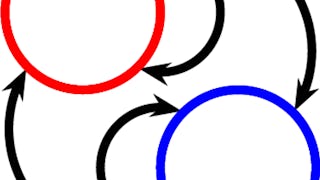Unlock the power of logical thinking and formal reasoning essential for success in computer science, data analysis, and software development with this dynamic course. Ideal for students, software engineers, data scientists, and IT professionals, this comprehensive program delves into logic foundations critical for advanced computing careers.
通过 Coursera Plus 解锁访问 10,000 多门课程。开始 7 天免费试用。


您将学到什么
Analyse computational problems to identify appropriate proof techniques and logical reasoning methods that best address their complexities.
Design comprehensive solutions to algorithm development challenges by synthesising and applying principles of propositional and predicate logic.
Evaluate system reliability by conducting model checking using temporal logics, and interpret the results to ensure system correctness.
Construct formal verification plans for algorithms and programs using Floyd-Hoare logics and justify their correctness through logical reasoning.
您将获得的技能
要了解的详细信息

添加到您的领英档案
August 2025
113 项作业
了解顶级公司的员工如何掌握热门技能

积累特定领域的专业知识
- 向行业专家学习新概念
- 获得对主题或工具的基础理解
- 通过实践项目培养工作相关技能
- 获得可共享的职业证书

该课程共有10个模块
In this module, you will learn the relevance of formal logics in computer science. You will understand the difference between syntax and semantics. The module will also introduce you to propositional logic and informally to its syntactic constructs.
涵盖的内容
10个视频4篇阅读材料8个作业
In this module, you will learn about the symbolic manipulation technique of natural deduction. The module will also discuss the different rules of natural deduction with examples.
涵盖的内容
12个视频3篇阅读材料11个作业
In this module, you will learn about state-of-the-art methods of resolution and Davis-Putnam-Logemann-Loveland (DPLL) methods to argue about the satisfiability of a propositional logic formula. We study the relevant characteristics of a logical theory, i.e., the consistency, soundness, and completeness, and comment on natural deduction as a proof technique on how it scores over these characteristics.
涵盖的内容
14个视频3篇阅读材料13个作业
In this module, you will be introduced to model-based formal verification techniques, in particular, the model checking techniques. The module will informally discuss two popular families of temporal logics: linear temporal logic (LTL) and computation tree logic (CTL).
涵盖的内容
13个视频4篇阅读材料12个作业
In this module, you will formally learn the LTL and CTL temporal logics. The module will also introduce you to the algorithms used for model checking over these algorithms. The module will further explain fundamental system properties, such as invariance, safety, and liveliness. Furthermore, the module will give provide you insight into how to encode natural language sentences into LTL and CTL formulas.
涵盖的内容
13个视频5篇阅读材料12个作业
In this module, you will learn the need for predicate logic and how to express statements in predicate logic. You will also learn about the syntax of predicate logic and the fundamentals behind writing proofs in predicate logic. You would also learn the concept of substitution and the difference between the free variables and bound variables. You will also get introduced to basic predicate logic rules that are used for proving sequents.
涵盖的内容
23个视频4篇阅读材料22个作业
In this module, you will learn to apply the proof rules of natural deduction to prove sequents in predicate logic. The proof rules that you would learn include: Universal Quantifier Elimination, Existential Quantifier Introduction, Universal Quantifier Introduction and Existential Quantifier Elimination. You would also learn to identify which specific rules to apply for writing proof of a given sequent.
涵盖的内容
17个视频3篇阅读材料5个作业
In this module, you will learn about semantics and model interpretations in predicate logic. You would also learn about the satisfiability and validity of predicate logic formulas, along with the undecidability of validity. You would also learn about the limitations of first-order predicate logic and how second-order predicate logic is useful in such cases.
涵盖的内容
20个视频4篇阅读材料19个作业
In this module, you will learn how to formally verify programs written in imperative style. More specifically, you will learn formal methods to verify assignment statements, sequence of statements, conditional statements, and iterative statements. You will also learn the formal method to verify whether a given program terminates or not.
涵盖的内容
16个视频5篇阅读材料10个作业
In this module, you will learn to prove the total correctness of various commonly used algorithms such as computing the power of two numbers, finding an element from an unsorted array, and selection sort. You would also learn to deduce loop invariants for programs of the above computational problems and prove that these programs terminates.
涵盖的内容
11个视频3篇阅读材料1个作业
获得职业证书
将此证书添加到您的 LinkedIn 个人资料、简历或履历中。在社交媒体和绩效考核中分享。
位教师

从 Algorithms 浏览更多内容
 状态:预览
状态:预览University of Leeds
 状态:预览
状态:预览Stanford University
 状态:免费试用
状态:免费试用
University of Colorado Boulder
人们为什么选择 Coursera 来帮助自己实现职业发展




常见问题
To access the course materials, assignments and to earn a Certificate, you will need to purchase the Certificate experience when you enroll in a course. You can try a Free Trial instead, or apply for Financial Aid. The course may offer 'Full Course, No Certificate' instead. This option lets you see all course materials, submit required assessments, and get a final grade. This also means that you will not be able to purchase a Certificate experience.
When you enroll in the course, you get access to all of the courses in the Specialization, and you earn a certificate when you complete the work. Your electronic Certificate will be added to your Accomplishments page - from there, you can print your Certificate or add it to your LinkedIn profile.
Yes. In select learning programs, you can apply for financial aid or a scholarship if you can’t afford the enrollment fee. If fin aid or scholarship is available for your learning program selection, you’ll find a link to apply on the description page.
更多问题
提供助学金,



